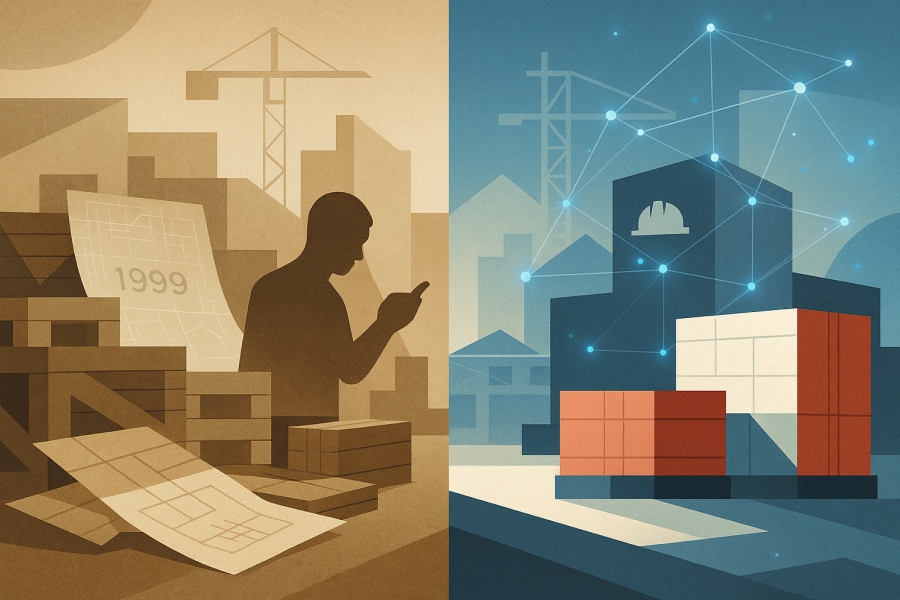How does the construction supply chain impact project success?
For a company to be successful, several elements need to come together. Having the right product, finding enthusiastic customers and having the capital and staffing resources to weather a range of trading conditions are all vital.
Since those working in construction need to be able to source materials reliably, the relationship such companies have with their suppliers is another ingredient necessary for success.
Having a plan for how this will work, how a company will source what it needs, how much it pays for it, how it will cope when supplies dry up, is crucial. Working closely with suppliers can make all the difference in delivering a project on time and within budget.
Managing one’s supply chain, like almost all activities in construction, means dealing with a series of challenges. And as the sector becomes ever more sophisticated, supply chain technology—particularly digitization—is marking its mark.
What is supply chain management?
The University of Maryland (UoM) in the US describes supply chain management as “the handling of the entire process of turning raw materials into a final product.”
Those involved in the construction supply chain range from those sourcing the original material—timber, cement, ore, steel, chemicals, etc.—to those who process it into secondary products, such as frames and girders.
Then there are those who act as brokers, selling either the raw materials or any resulting finished goods to customers such as construction companies, who use them in their projects. Others in the supply chain include distributors, storage companies, product development specialists, retailers and those involved at the customer service end.
Effective supply chain management is important so that materials can be delivered on time. There are inevitably plenty of challenges around this which, if not dealt with properly, can result in delays and potential financial losses.
What events can disrupt a supply chain?
The importance of supply chain management becomes particularly acute when an event or series of events occurs that disturbs the flow of materials.
One recent example: the COVID-19 pandemic, which hit global trade, disrupting the ability of supplies to be easily transported across the world.
Other so-called “black swan” events can be more localised, but no less impactful. In Egypt, for example, the blockage of the Suez canal by the container ship the Ever Given in the middle of the pandemic held up shipments of materials through the waterway for days, costing businesses billions.
Then, as the world began to recover from the economic impact of the virus, Russia invaded Ukraine, prompting a wave of sanctions that prevented companies from buying the former’s materials, but more importantly put pressure on stocks that were legitimately available elsewhere.
Admittedly, there is only so much a company can do in the face of events taking place far away. But such supply fluctuations and disruptions inevitably force businesses to look at how they might be able to do things differently.
Making the construction supply chain more sustainable
As well as navigating “black swan” events, the supply chain also needs to adapt to environmental concerns. The drive to access more sustainable materials is part of the construction sector’s efforts to combat issues around resources and climate change.
According to a report, “Greening the Chain,” published by contracting giant Balfour Beatty, the supply chain is responsible for 80% of the UK construction sector’s emissions. Work is being done to address this, although the firm’s research found that cost remains a factor in shaping the pace of change toward—and acceptance of—more environmentally friendly materials.
That said, the industry’s environmental aims and supply chain management can be mutually inclusive. According to consultancy EY, focusing on supply chains is key to improving the environmental, social and governance landscape.
“Beyond risk avoidance and compliance, organisations are seeking ways to create long-term value by embedding sustainability into supply chain operations,” it says.
As part of its journey toward greater efficiency and effectiveness, it is also important that suppliers are familiar with the latest developments in construction, so they can respond to demand trends.
Highlighting the importance of modern building techniques, Ben Jayes, managing director of products distributor Vivalda Group, warned that while most big manufacturers were up to speed with the demands of off-site construction, many suppliers further down the supply chain were unclear how to engage with a just-in-time production line.
“Products need to be delivered at a certain time, quality checked and then made ready for its slot within the assembly process. Crucially, this is at the centre of the modular building sector. And we all know the adage that a supply chain is only as strong as its weakest link,” he said.
The rise of new technology in supply chain management
In terms of where supply chain management goes next, the importance of data—its collection and interpretation—and other areas of information technology such as BIM, AI and virtual reality, to the mechanics of the supply chain is increasing all the time.
The use of data and advanced analytics helps companies identify and more accurately forecast potential problems along the supply chain.
Then there is automation, which in warehousing and storage is freeing up staff to do other jobs, while robots pick and sort materials more efficiently. The use of digital technology, meanwhile, is expected to streamline supply chains, making them more mobile and resilient.
The reliability of construction supply chain management will be enhanced by the increasing take-up of digitisation and the Internet of Things, otherwise known as Industry 4.0.
Consultancy McKinsey says Industry 4.0 “creates a disruption and requires companies to rethink the way they design their supply chain. Several technologies have emerged that are altering traditional ways of working”.
McKinsey says that shifting trends and customer expectations “change the game. Besides the need to adapt, supply chains also have the opportunity to reach the next horizon of operational effectiveness, to leverage emerging digital supply chain business models, and to transform the company into a digital supply chain.”
With advances in technology and a willingness to accept such change, supply chain management across construction will evolve. There will still be disruptions and hold-ups to supplies of materials. But the industry will manage the art of meeting such challenges.











